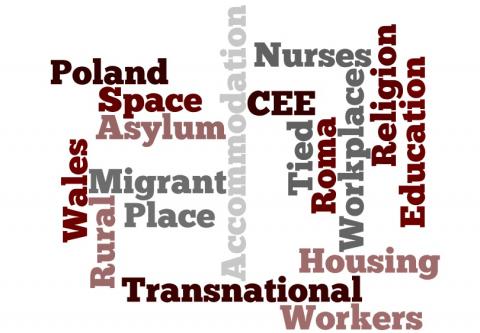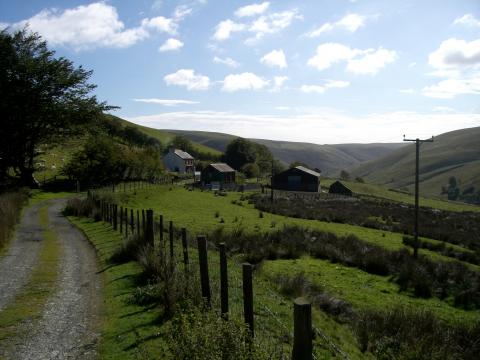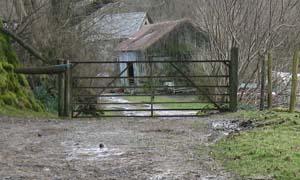Research Archive
Information about the WRO's Work Programme for 2007-2010 is provided below, with links through to the resulting reports for you to download.
1. Central and Eastern European Migrant Workers in Rural Wales
This project examined the characteristics, experiences and intentions of migrant workers from the Accession States of Central and Eastern Europe in Rural Wales. The research involved interviews with key stakeholders and analysis of data concerning National Insurance and Workers Registration Scheme registrations, combined with structured interviews with 100 migrant workers in four case study areas.  These interviews were conducted predominantly in Polish following a structured questionnaire that covered questions including the interviewee’s background, reasons for coming to Wales, employment, housing, interaction with the local community and future intentions. Interviewees were identified using a snowball method, with 25 interviews in each of the case study areas of Betws-y-Coed / Llanrwst, Carmarthenshire / Ceredigion, Haverfordwest / Milford Haven, and Welshpool. The research identified the diverse background and experiences of migrant workers in Wales, proposing a categorization of migrant workers into four groups of ‘neo-guestworkers’, ‘experiential migrants’, ‘settlers’ and ‘transnational specialist workers’, each with a different geographical concentration in rural Wales, and with different experiences of interaction with local communities and differing intentions about remaining in the UK or returning home.
These interviews were conducted predominantly in Polish following a structured questionnaire that covered questions including the interviewee’s background, reasons for coming to Wales, employment, housing, interaction with the local community and future intentions. Interviewees were identified using a snowball method, with 25 interviews in each of the case study areas of Betws-y-Coed / Llanrwst, Carmarthenshire / Ceredigion, Haverfordwest / Milford Haven, and Welshpool. The research identified the diverse background and experiences of migrant workers in Wales, proposing a categorization of migrant workers into four groups of ‘neo-guestworkers’, ‘experiential migrants’, ‘settlers’ and ‘transnational specialist workers’, each with a different geographical concentration in rural Wales, and with different experiences of interaction with local communities and differing intentions about remaining in the UK or returning home.
Methods: The research involved interviews with key stakeholders and analysis of data concerning National Insurance and Workers Registration Scheme registrations, combined with structured interviews with 100 migrant workers in four case study areas.
Spatial Scale: Localities of Betws-y-Coed / Llanrwst, Carmarthenshire / Ceredigion, Haverfordwest / Milford Haven and Welshpool.
Themes: Rural Economy and Employment, Society and Community, Housing and Services.
Overview: Following the publication in 2008 of the policy document ‘One Wales’, which identified a need to address the particular issues affecting ‘deep rural’ areas in Wales, the Welsh Government commissioned the Wales WRO to undertake extensive research into these issues. The aim of the research was to explore how residents experienced life in ‘deep rural’ parts of Wales, with a focus on the strategies and  mechanisms adopted with regard to service provision. The findings indicated that residents were generally satisfied with living in these areas. However, they did express some concerns. These included the high cost of living; a diminution of rural services; limited employment prospects; WAG’s lack of rural focus; the sustainability of both rural communities and the Welsh language; poor public transport services; and inadequate broadband services. The standard of broadband provision also concerned service providers. Service providers raised a range of other issues. They argued that rural budgets were too small; that service provision should be led by ‘needs’ rather than by the interests of suppliers and producers; that there was a need to better support SMEs, which were seen to be the basis of the rural economy; and that rural proofing of WAG and national government policies did not appear to taking place.
mechanisms adopted with regard to service provision. The findings indicated that residents were generally satisfied with living in these areas. However, they did express some concerns. These included the high cost of living; a diminution of rural services; limited employment prospects; WAG’s lack of rural focus; the sustainability of both rural communities and the Welsh language; poor public transport services; and inadequate broadband services. The standard of broadband provision also concerned service providers. Service providers raised a range of other issues. They argued that rural budgets were too small; that service provision should be led by ‘needs’ rather than by the interests of suppliers and producers; that there was a need to better support SMEs, which were seen to be the basis of the rural economy; and that rural proofing of WAG and national government policies did not appear to taking place.
Methods: Four research methods were used. These were a household survey; in-depth interviews with residents of the areas; focus groups with young people; and a survey of service providers with interests in these areas.
Spatial Scale: In order to provide different regional perspectives, four broad research areas were specified: the Llyn peninsula of Gwynedd, north Powys, south Powys and north Pembrokeshire. Initially, ‘deep rural’ areas were defined as communities with fewer than 1,000 households, located at least 30 minutes drive-time from a centre with a population of more than 10,000.
Themes: ‘Deep Rural’, Community, Culture, Services, Transport and Mobilities, Sustainable communities.
3. The Impacts of the Current Recession in Rural Wales
Overview: The Wales Rural Observatory was commissioned by the Rural Policy Unit of the Welsh Government in April 2009 to undertake research on the impacts of the current recession in rural Wales. The aim of the research was to examine the economic, employment, housing, welfare and social
 consequences of the recession in rural areas, with a view to examining its spatial impacts in Wales. This involved comparing the rural and non-rural situations, as well as geographical impacts within rural Wales. The findings pointed to rising levels of unemployment, redundancies, business insolvencies, property repossessions, and debt advice enquiries in rural Wales, as well as the geographical unevenness of these increases within rural areas. In addition, material from the stakeholder interviews was used to highlight the differential temporal, sectoral and social impacts of the recession in rural Wales, and particularly the role of the public sector in softening and delaying the impacts of the recession in rural places.
consequences of the recession in rural areas, with a view to examining its spatial impacts in Wales. This involved comparing the rural and non-rural situations, as well as geographical impacts within rural Wales. The findings pointed to rising levels of unemployment, redundancies, business insolvencies, property repossessions, and debt advice enquiries in rural Wales, as well as the geographical unevenness of these increases within rural areas. In addition, material from the stakeholder interviews was used to highlight the differential temporal, sectoral and social impacts of the recession in rural Wales, and particularly the role of the public sector in softening and delaying the impacts of the recession in rural places.
Methods: The research involved interviews with around 40 stakeholders, including business organisations, trades union, housing agencies, and health and welfare groups, together with spatial analyses of a broad range of economic, housing, social and welfare data.
Spatial Scale: All Wales
Themes Recession, Public sector cuts, Unemployment, Economic activity, Homelessness, Welfare and Advice, Rural economy, Agriculture, Tourism.
Overview: This project explored changes in the state of non-farm businesses in rural Wales for the period August 2004 to August 2007. As a part of its programme of research the Wales Rural Observatory conducted a survey of 1008 businesses in rural Wales during 2004. There was a similar survey of 1034 businesses in 2007. This report makes some comparisons between the findings of the two Rural Business Surveys.
Methods: Desk-based research
Spatial Scale: Rural Wales
Themes: Profiles of owners and employees, Recruitment, Economic performance, Business practice.
5. Household Comparison Report 2004-2007
Overview: This project explored changes, at the household level, for people living and working in rural Wales for the period March 2004 to August 2007. As a part of its programme of research the Wales Rural Observatory conducted a survey of 4,023 households in rural Wales during 2004. All respondents in the 2004 survey were asked if they could be re-contacted, and out of 4,023, 3406 agreed. Out of these, interviews with 1,438 were conducted which constitutes the longitudinal sample used in this report. Using questions that were in both the 2004 and 2007 surveys, this report presents a comparison of all the data produced during both phases of research, and the longitudinal data, which compares changes for the same people over the time period.
Methods: Desk-based research
Spatial Scale: Rural Wales
Themes: Population, community, employment, Change
6. A Survey of Farming Households in Wales 2010
Overview: The core of this project was a survey of 1,009 farming households in Wales, carried out between 29th Janu ary 2010 and 3rd March 2010. In outline the aims of the project were to identify farming household income streams; assess the extent of diversification and multiple jobs; assess household resilience with regard to CAP reform; explore possible responses to CAP reform; and explore behavioural attitudes. More broadly, the project provided evidence to allow the Welsh Government to monitor the impact of its policies and to inform the implementation of the Rural Development Plan [RDP].
ary 2010 and 3rd March 2010. In outline the aims of the project were to identify farming household income streams; assess the extent of diversification and multiple jobs; assess household resilience with regard to CAP reform; explore possible responses to CAP reform; and explore behavioural attitudes. More broadly, the project provided evidence to allow the Welsh Government to monitor the impact of its policies and to inform the implementation of the Rural Development Plan [RDP].
Methods: Telephone survey
Spatial Scale: All Wales
Themes: Household income streams, Diversification, Multifunctionality, Entrepreneurship, Resilience with regard to CAP.
7. Rural Household Survey 2010
This report presents findings from a survey of households in rural Wales undertaken by the WRO's researchers in 2010-11. It is the third in a series of household surveys carried out by the WRO and follows on from the previous surveys undertaken in 2004 and 2007. The results provide updated information and additional longitudinal data allowing further in-depth comparative work. Key themes explored in the report include: locality and demographics; the local social and community context; well-being and welfare; rural service provision, rural employment and the economy; and the environment.
This report provides an overview of results from a survey of rural services in Wales, which was conducted in 2010. The 2010 survey is the third in a triennial series, following the 2004 and 2007 services surveys.
The 2010 Business Survey was the third in a triennial series, following the 2004 and 2007 surveys. It was designed as an integral part of the work programme, with an underlying rationale that the survey would complement and build on completed WRO work; drawing on the 2004 and 2007 surveys it would
provide longitudinal data; and it would provide a data source for future WRO work. The broad aims of the survey were to examine the state of rural (non-farm) business activities in Wales. More specifically the survey aimed to explore, quantify and provide qualitative data on the attitudes of rural business owners in Wales concerning a range of business, economic and environmental issues. In addition, the survey aimed to ascertain what changes had affected businesses in rural Wales.
10. Rural Business Survey 2008
Overview: A survey of non-agricultural businesses in rural Wales
Methods: Extensive postal survey of businesses. Quantitative analysis and dovetailing with existing data bases.
Spatial Scale: Rural Wales
Themes: Economy and Employment.
11. Rural Services Survey 2008
Overview: This survey provided important contextual information for other research carried out by the WRO and informed policy makers in Wales of the ‘state of rural services’ in rural Wales. The survey data was also added to the GIS database at the Community level allowing it to be combined with other datasets at that spatial scale.
Methods: Postal survey of all Community Councils in rural Wales
Spatial Scale: Rural Wales
Themes: Social Exclusion and Inclusion, Housing and Services, Society and Community.
12. Rural Households Survey 2008
Nine projects were completed within the second phase of the WRO’s Work Programme, which ran from the Autumn of 2004 to 2006. Further details about the projects are provided below. Follow the links to access the reports.
1. Rural Labour Markets: exploring the mismatches
Overview: The project drew on findings from the national surveys to investigate the role played by labour market in selected rural areas of Wales, and provided a new evidence base of the complexities of rural labour markets in Wales.
Methods: A selection of key study sites involving interviewing, policy analysis and evaluation of existing schemes.
Spatial Scale: Spatially selected clusters of communities across Wales.
Themes: Economy and Employment, Social Exclusion and Inclusion.
2. Poverty and Social Exclusion in Rural Wales
Overview: Drawing on key findings from the national survey of households and data from the GIS, this project will provide an in-depth examination of the nature and experiences of material poverty and broader aspects of social exclusion in rural areas of Wales. It will also focus on the ways that agencies working in rural Wales have been developing anti-poverty and social inclusionary polices to deal with rural disadvantage. Within this project, particular importance will be place on how poverty and social exclusion are experienced by different disadvantaged groups (such as those in work, the unemployed, the elderly, young people, the disabled) in different areas of rural Wales.
Methods: Analysis of statistical data from the household survey and the GIS, survey of a broad range of welfare agencies, focus groups and interviews with poor and socially excluded groups.
Spatial scale: Rural Wales and selected localities / policy initiatives.
Themes: Environment, Sustainability and Land-use Planning; Social Exclusion and Inclusion; Housing and Services; Society and Community.
3: Homelessness in Rural Wales
Overview: This project will examine the changing nature and scale of homelessness in rural Wales, explore current agency responses to rural homelessness, identify key obstacles to delivering services to homeless people in rural areas, and identify good practice in tackling rural homelessness.
Methods: Analyses of homelessness statistics; national stakeholder interviews; local case studies.
Spatial scale: Rural Wales and selected unitary authorities and policy initiatives.
Themes: Social Exclusion and Inclusion; Housing and Services; Society and Community.
4. Housing Need in Rural Wales: Towards sustainable solutions
Overview: This project provided the first comprehensive evidence on the nature and scale of housing need, and policy initiatives aimed at dealing with such need, in rural Wales.
Methods: The project was based around the collection of statistical information on the scale and nature of rural housing need and homelessness, a postal survey of relevant agencies, and follow-on interviews with selected responding agencies.
Spatial scale: Rural Wales and selected unitary authorities / policy initiatives.
Themes: Environment, Sustainability and Land-use Planning; Social Exclusion and Inclusion; Housing and Services; Society and Community.
5. Small and Market Towns in Rural Wales and Their Hinterlands
Overview: This project explored the social and economic interactions between market towns and their neighbouring communities, through case studies of five towns in different parts of rural Wales. Investigation of economic interactions involved mapping of the ‘economic footprint’ of the towns through studies of employment, business procurement sales.
Methods: The project will draw on data from the GIS database, the household survey and the business survey. Additionally, each case study will involve a booster survey of local employers; a survey of local clubs, societies and associations; interviews with business representatives, society officers and event organisers (estimated 10 per case study); and analysis of local newspaper reports.
Spatial scale: Market towns of between 2,500 and 10,000 population.
Themes: Economy and Employment; Housing and Services; Society and Community.
6. The Significance of Public Sector Employment in Rural Wales
Overview: This project examined the changing significance of the public sector in rural Wales, from an economic and a social perspective.
Methods: Up to 30 telephone interviews, supported by desk- and web-based documentary research. Limited number of visits and interviews in case study areas.
Spatial Scale: Baseline data will be comprehensive across rural Wales, with particular localities selected for case studies.
Themes: Economy and Employment; Housing and Services; Society and Community.
7. Assessing the Eco-economy of Rural Wales
Overview: The aim of this project was to examine, using a variety of techniques, how the potential synergies between environmental resources and economic activities can be enhanced; for example, between tourism, quality agriculture / landscapes and environmental access and facilities.
Methods: Case studies derived from the national surveys, in addition to the examination of good practice and its potential diffusion to wider areas. Key person interviewing of private sector actors and networks.
Spatial Scale: Samples drawn from the range of different rural contexts across Wales
Themes: Economy and Employment; Environment.
8. Coping with Access to Services
Overview:. A key aim of this work was to gain a better understanding of the coping tactics that are adopted by individuals and groups in rural communities to deal with the loss of different services.
Methods: The research will draw on point-level datasets held within the GIS, which includes data for the current situation as well as historical data of key services locations held by the project team in a GIS database (dating back to 1995). It will also utilise qualitative methods to explore the coping strategies employed by different groups in particular case-study areas.
Themes: Social Exclusion and Inclusion; Housing and Services; Society and Community.
9. Population Change in Rural Wales: Social and Cultural Impacts
Overview: The project examined changes in the population of rural Wales, looking primarily at the social and cultural impacts of population change on rural community life, and aimed to show how population composition determines levels and types of social capital held in rural Wales.
Methods: The project will draw upon data generated by the household survey and the GIS database. It will also use in-depth case studies of communities subject to differing types of population pressures (e.g. stasis or depopulation versus in-migration). In these communities, participant observation and semi-structured interviews will be utilised to examine the impact of population change on community activities, political activities and cultural activities.
Spatial scale: Macro-level changes in population of rural Wales combined with in-depth studies of Welsh rural communities.
Themes: Environment, Sustainability and Land-use Planning; Social Exclusion and Inclusion; Housing and Services; Society and Community.
Phase One of the work programme, which ran from January to September 2004, saw the completion of major surveys on themes including living and working in rural Wales, rural services, rural businesses and rural policy. Further details about the projects are provided below.
1. Survey: Living and Working in Rural Wales
Overview: The first and largest of the research projects consisted of a major survey of a representative sample of 4,000 households in rural Wales. Data from the survey were presented and analysed at different spatial scales (for example, by settlement type and by degrees of remoteness / accessibility) and data was inputted into the Observatory’s GIS. Key findings from the survey were used to inform several of the second phase research projects.
Methods: Telephone survey of a representative sample of 4,000 households
Spatial Scale: Rural Wales
Themes: Economy and Employment; Environment, Sustainability and Land-use Planning; Social Exclusion and Inclusion; Housing and Services; Society and Community.
Overview: This survey provided important contextual information for other research carried out by the WRO and informed policy makers in Wales of the ‘state of rural services’ in rural Wales. The survey data was also added to the GIS database at the Community level allowing it to be combined with other datasets at that spatial scale.
Methods: Postal survey of all rural community councils
Spatial Scale: Rural Wales
Themes: Social Exclusion and Inclusion; Housing and Services; Society and Community.
Overview: A priority for the WRO under its ‘Rural economy and employment’ work programme was to conduct an extensive survey of non-agricultural businesses in rural Wales. The survey provided an extensive baseline (n 1000) of firms in rural Wales that offered reliable and comparative data on the state of businesses, their activities, development potential, obstacles and type of entrepreneurial practices.
Methods: Extensive postal survey of businesses. Quantitative analysis and dovetailing with existing data bases.
Spatial Scale: Rural Wales
Themes: Economy and Employment.
4. Survey of Policy, Programmes and Resources for Rural Wales
Overview: This project examined current policy, programmes and resources supporting rural Wales. The information gathered informed an overview of the current and emerging challenges and opportunities for sustainability and change in rural Wales.
Methods: Data were collected from a number of sources including: the Welsh Assembly Government, European Union and Whitehall government departments, and statutory agencies and other organisations supporting rural Wales. The project included library and web-based documentary research and a postal questionnaire survey of Unitary Authorities, National Park Authorities, Assembly-Sponsored Public Bodies and a range of Non-statutory Organisations.
Spatial Scale: Rural Wales
Themes: Economy and Employment; Environment, Sustainability and Land-use Planning; Social Exclusion and Inclusion; Housing and Services; Society and Community.
Earlier research also included:
Gender and Rural Wales Scoping Report 2007
Statistical Report on Rural Wales: Volume 1
An Overview of Policy and Resources Impacting on Rural Wales 2004
Scoping Study on Eastern and Central European Migrant Workers in Rural Wales 2006
Maps
Theme 1: Economy and Employment
Theme 2: Environment, Sustainability and Land Use
Theme 3: Social Exclusion and Inclusion




